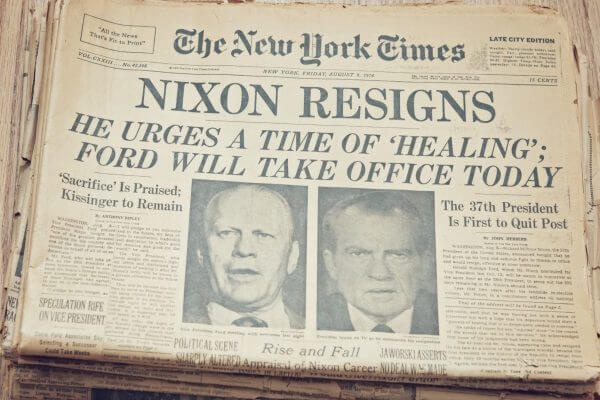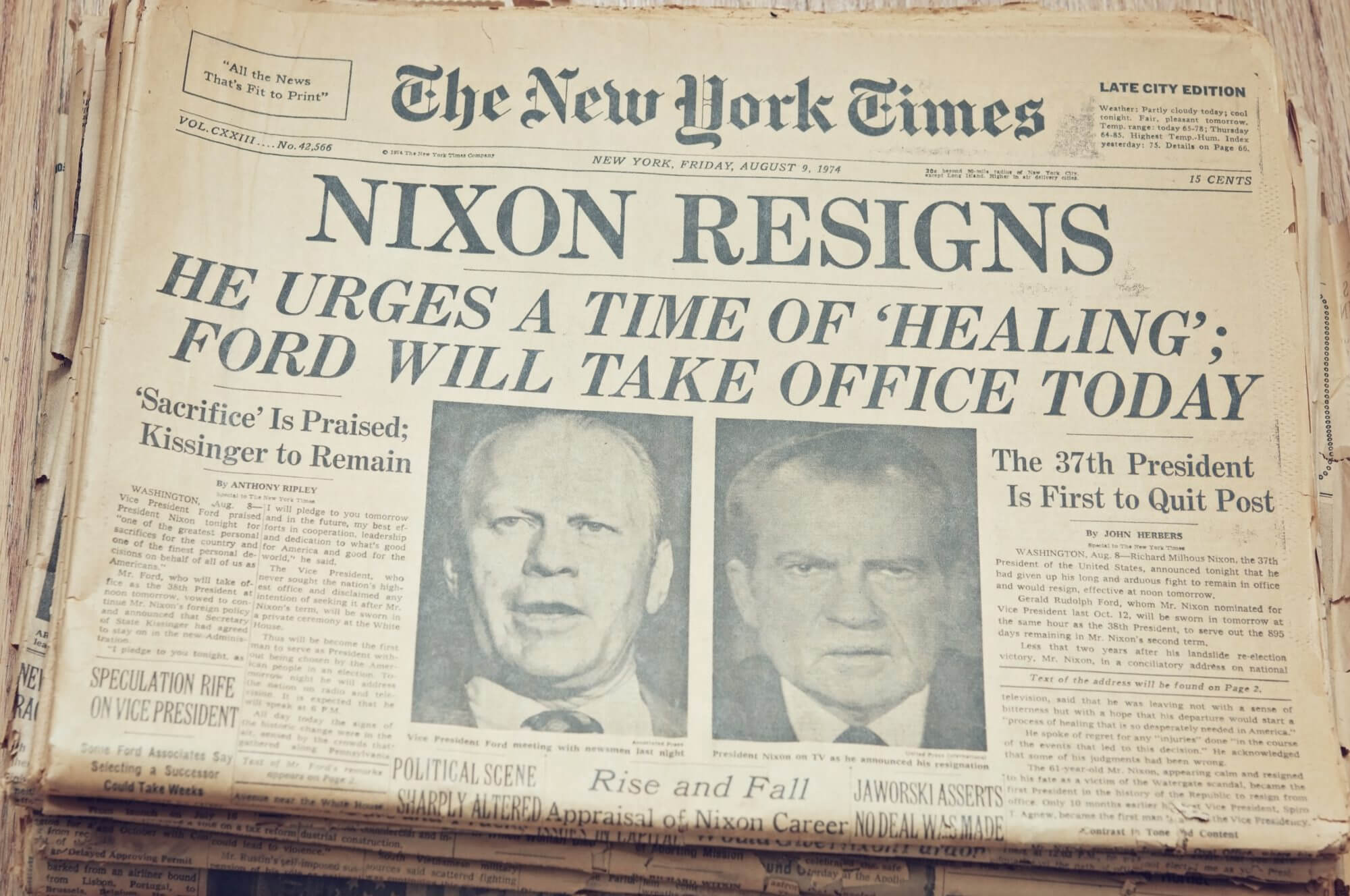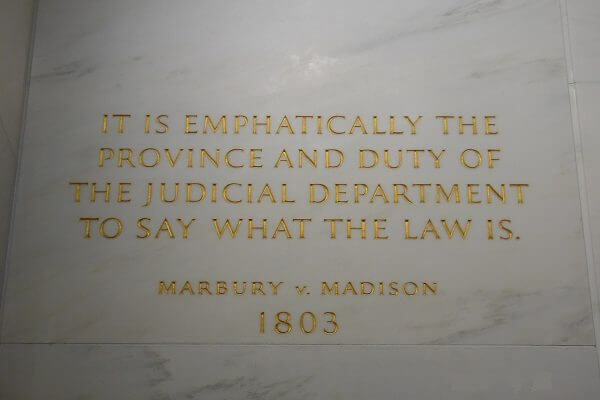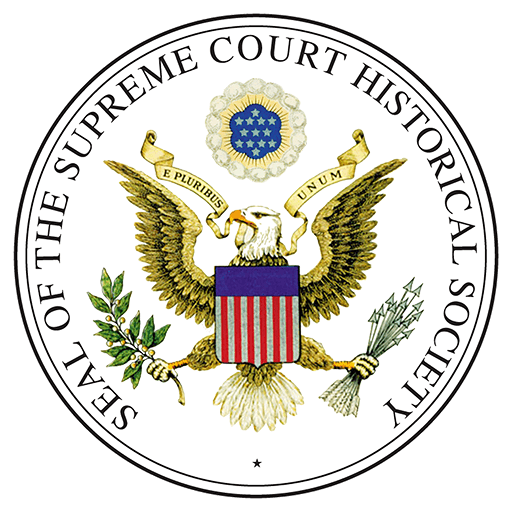
United States v. Nixon (1974)
Court Limits Executive Privilege, Orders Nixon to Release Tapes
A close up of the front page of the The New York Times newspaper reporting that President Richard Nixon resigned after the Watergate scandal.
Overview
A congressional hearing about President Nixon’s Watergate break-in scandal revealed that he had installed a tape-recording device in the Oval Office. The special prosecutor in charge of the case wanted access to these taped discussions to help prove that President Nixon and his aides had abused their power and broken the law. President Nixon claimed executive privilege and refused to hand over the tapes. President Nixon’s incomplete compliance with the special prosecutor’s demands was challenged and eventually taken to the Supreme Court of the United States. The Court decided that executive privilege is not limitless, and the tapes were released.

A close up of the front page of the The New York Times newspaper reporting that President Richard Nixon resigned after the Watergate scandal.
"Absent a claim of need to protect military, diplomatic, or sensitive national security secrets, we find it difficult to accept the . . . [absolute] confidentiality of presidential communications."
- Chief Justice Warren Burger, speaking for the majority
Learning About United States v. Nixon
Students
This section is for students. Use the links below to download classroom-ready .PDFs of case resources and activities.
About the Case
Full Case Summaries
A thorough summary of case facts, issues, relevant constitutional provisions/statutes/precedents, arguments for each side, decision, and case impact.
Case Background and Vocabulary
Important background information and related vocabulary terms.
- Background Reading (Middle School ·)
- Background Reading (High School ··)
- Background Reading (Advanced ···)
- Vocabulary (Middle School ·)
- Vocabulary (High School/Advanced ··/···)
Learning Activities
Teachers
Use the links below to access:
- student versions of the activities in .PDF and Word formats
- how to differentiate and adapt the materials
- how to scaffold the activities
- how to extend the activities
- technology suggestions
- answers to select activities
(Learn more about Street Law's commitment and approach to a quality curriculum.)
About the Case
- Full Case Summaries: A summary of case facts, issues, relevant constitutional provisions/statutes/precedents, arguments for each side, decision, and impact. Available at high school and middle school levels.
- Case Background: Background information at three reading levels.
- Case Vocabulary: Important related vocabulary terms at two reading levels.
- Diagram of How the Case Moved Through the Court System
- Case Summary Graphic Organizer
- Case Summary Graphic Organizer - Fillable
- Decision: A summary of the decision and key excerpts from the opinion(s)
Learning Activities
Teacher Resources
Teaching Strategies Used
Planning Time and Activities
If you have ONE day...
- Read the background summary (•••, ••, •) and answer the questions.
- Complete the Classifying Arguments Activity. Discuss which arguments the students find most convincing.
- In advanced classes, complete the Oral Argument Analysis (•••) activity.
- For homework, have students read the Key Excerpts from the Opinion and answer the questions. Follow up the next day by reviewing the questions with students.
If you have TWO days...
- Complete the activities for the first day (excluding homework).
- On the second day, complete the Cartoon Analysis activity
- Complete the Principles of Democracy activity
- For homework, have students read the Key Excerpts from the Opinion and answer the questions. Follow up the next day by reviewing the questions with students.
If you have THREE days...
- Complete the activities for the first and second days (including homework).
- On the third day, have students complete the Should it be Protected? activity.
- Complete Nixon’s Views on Presidential Power.
- For homework, have students complete Comparing Impeachments in U.S. History
If you have FOUR days...
- Complete the activities for the first, second, and third days (excluding homework from the third day).
- On the fourth day, have students complete President Clinton: The President as Defendant
- Complete Comparing Impeachments in U.S. History
- For homework, have students learn more about the effect of the Watergate scandal on legal ethics using The Legacy of Watergate: Rethinking Legal Ethics.
Glossary
These are terms you will encounter during your study of United States v. Nixon. View all Glossary terms here.
Related Cases
Legal Concepts
- These are legal concepts seen in United States v. Nixon. Click a legal concept for an explanation and a list of other cases where it can be seen. View all Legal Concepts here.

